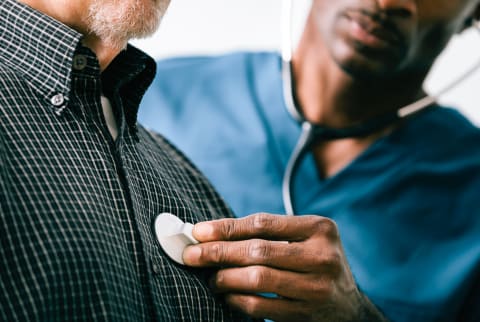Earlier this year, some of the nation’s leading cardiologists updated the list using the latest research and made the first addition to Life’s Simple 7 (now Life’s Essential 8) in over a decade: Get healthy sleep2. Here’s why sleep is just as important for preventing cardiovascular disease as eating right and staying active—if not more so—and how to make sure you’re getting enough of it for heart health. “If you don’t heal your mitochondria at night, it almost doesn’t matter how well you eat or how much you exercise; your body has broken mitochondrial engines, and you’re not going to make energy as efficiently,” Twyman said. Getting a solid night’s sleep can also reduce other cardiovascular risk factors such as chronic inflammation3, high blood pressure4, and blood sugar disturbance5, according to the AHA. It brings mental health benefits, too, and mental health disorders can also contribute to heart disease6. One study conducted on nearly 7,000 U.S. adults earlier this year found that those who reported poor sleep had a higher risk of developing heart disease7, regardless of race or sex. In another 2022 study, older people with insomnia were significantly more likely to have had a heart attack or undergone a procedure to open blocked arteries in the past 16 months than those who did not have the sleep disorder. The only other risk factors that were more significant than insomnia in this research were smoking and low physical activity. As lead study author Lars Frojd writes in a news release8, “16% of recurrent major adverse cardiovascular events might have been avoided if none of the participants had insomnia.” Research shows, for example, that the bedtime associated with a lower risk of developing heart disease9 is between 10 and 11 p.m. There is no magic number of hours that we should aim to spend in bed each night (sleep is highly personalized), but most sleep specialists agree that anywhere in the seven- to nine-hour range will be healthy for most adults. These should be high-quality hours, spent in deeper sleep stages where most rest and repair take place. If you have trouble falling or staying asleep, or find yourself always waking up tired, this is your cue to make rest more of a priority. Some of the best ways to do so are to go to bed and wake up at the same time every day, turn off bright lights and electronics at night, be mindful of late-night eating and drinking, and design your day around your circadian rhythm. Taking a sleep supplement can also help improve your sleep quality. Here are our favorite science-backed sleep aids for nightly support. Emma received her B.A. in Environmental Science & Policy with a specialty in environmental communications from Duke University. In addition to penning over 1,000 mbg articles on topics from the water crisis in California to the rise of urban beekeeping, her work has appeared on Grist, Bloomberg News, Bustle, and Forbes. She’s spoken about the intersection of self-care and sustainability on podcasts and live events alongside environmental thought leaders like Marci Zaroff, Gay Browne, and Summer Rayne Oakes.



